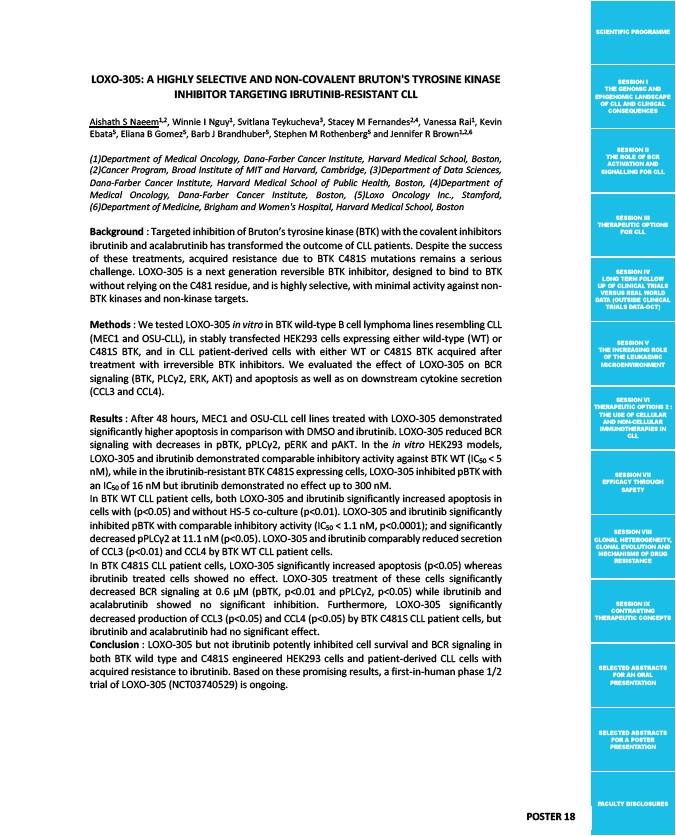
SCIENTIFIC PROGRAMME
SESSION I
THE GENOMIC AND
EPIGENOMIC LANDSCAPE
OF CLL AND CLINICAL
CONSEQUENCES
SESSION II
THE ROLE OF BCR
ACTIVATION AND
SIGNALLING FOR CLL
SESSION III
THERAPEUTIC OPTIONS
FOR CLL
SESSION IV
LONG TERM FOLLOW
UP OF CLINICAL TRIALS
VERSUS REAL WORLD
DATA (OUTSIDE CLINICAL
TRIALS DATA-OCT)
SESSION V
THE INCREASING ROLE
OF THE LEUKAEMIC
MICROENVIRONMENT
SESSION VI
THERAPEUTIC OPTIONS 2 :
THE USE OF CELLULAR
AND NON-CELLULAR
IMMUNOTHERAPIES IN
CLL
SESSION VII
EFFICACY THROUGH
SAFETY
SESSION VIII
CLONAL HETEROGENEITY,
CLONAL EVOLUTION AND
MECHANISMS OF DRUG
RESISTANCE
SESSION IX
CONTRASTING
THERAPEUTIC CONCEPTS
SELECTED ABSTRACTS
FOR AN ORAL
PRESENTATION
SELECTED ABSTRACTS
FOR A POSTER
PRESENTATION
FACULTY DISCLOSURES
LOXO-305: A HIGHLY SELECTIVE AND NON-COVALENT BRUTON'S TYROSINE KINASE
INHIBITOR TARGETING IBRUTINIB-RESISTANT CLL
Aishath S Naeem1,2, Winnie I Nguy1, Svitlana Teykucheva3, Stacey M Fernandes2,4, Vanessa Rai1, Kevin
Ebata5, Eliana B Gomez5, Barb J Brandhuber5, Stephen M Rothenberg5 and Jennifer R Brown1,2,6
(1)Department of Medical Oncology, Dana-Farber Cancer Institute, Harvard Medical School, Boston,
(2)Cancer Program, Broad Institute of MIT and Harvard, Cambridge, (3)Department of Data Sciences,
Dana-Farber Cancer Institute, Harvard Medical School of Public Health, Boston, (4)Department of
Medical Oncology, Dana-Farber Cancer Institute, Boston, (5)Loxo Oncology Inc., Stamford,
(6)Department of Medicine, Brigham and Women's Hospital, Harvard Medical School, Boston
Background : Targeted inhibition of Bruton’s tyrosine kinase (BTK) with the covalent inhibitors
ibrutinib and acalabrutinib has transformed the outcome of CLL patients. Despite the success
of these treatments, acquired resistance due to BTK C481S mutations remains a serious
challenge. LOXO-305 is a next generation reversible BTK inhibitor, designed to bind to BTK
without relying on the C481 residue, and is highly selective, with minimal activity against non-
BTK kinases and non-kinase targets.
Methods : We tested LOXO-305 in vitro in BTK wild-type B cell lymphoma lines resembling CLL
(MEC1 and OSU-CLL), in stably transfected HEK293 cells expressing either wild-type (WT) or
C481S BTK, and in CLL patient-derived cells with either WT or C481S BTK acquired after
treatment with irreversible BTK inhibitors. We evaluated the effect of LOXO-305 on BCR
signaling (BTK, PLCγ2, ERK, AKT) and apoptosis as well as on downstream cytokine secretion
(CCL3 and CCL4).
Results : After 48 hours, MEC1 and OSU-CLL cell lines treated with LOXO-305 demonstrated
significantly higher apoptosis in comparison with DMSO and ibrutinib. LOXO-305 reduced BCR
signaling with decreases in pBTK, pPLCγ2, pERK and pAKT. In the in vitro HEK293 models,
LOXO-305 and ibrutinib demonstrated comparable inhibitory activity against BTK WT (IC50 < 5
nM), while in the ibrutinib-resistant BTK C481S expressing cells, LOXO-305 inhibited pBTK with
an IC50 of 16 nM but ibrutinib demonstrated no effect up to 300 nM.
In BTK WT CLL patient cells, both LOXO-305 and ibrutinib significantly increased apoptosis in
cells with (p<0.05) and without HS-5 co-culture (p<0.01). LOXO-305 and ibrutinib significantly
inhibited pBTK with comparable inhibitory activity (IC50 < 1.1 nM, p<0.0001); and significantly
decreased pPLCγ2 at 11.1 nM (p<0.05). LOXO-305 and ibrutinib comparably reduced secretion
of CCL3 (p<0.01) and CCL4 by BTK WT CLL patient cells.
In BTK C481S CLL patient cells, LOXO-305 significantly increased apoptosis (p<0.05) whereas
ibrutinib treated cells showed no effect. LOXO-305 treatment of these cells significantly
decreased BCR signaling at 0.6 μM (pBTK, p<0.01 and pPLCγ2, p<0.05) while ibrutinib and
acalabrutinib showed no significant inhibition. Furthermore, LOXO-305 significantly
decreased production of CCL3 (p<0.05) and CCL4 (p<0.05) by BTK C481S CLL patient cells, but
ibrutinib and acalabrutinib had no significant effect.
Conclusion : LOXO-305 but not ibrutinib potently inhibited cell survival and BCR signaling in
both BTK wild type and C481S engineered HEK293 cells and patient-derived CLL cells with
acquired resistance to ibrutinib. Based on these promising results, a first-in-human phase 1/2
trial of LOXO-305 (NCT03740529) is ongoing.
POSTER 18